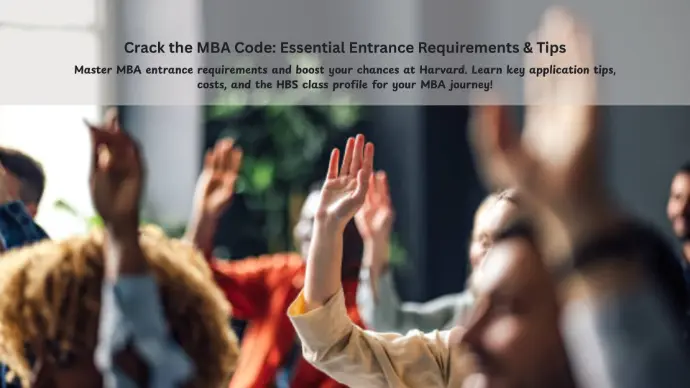
The path to an MBA is a challenging yet rewarding journey that begins with understanding the MBA entrance requirements. Whether you're aiming for a program at Harvard Business School or another top-ranked institution, it’s crucial to know what it takes to secure your place in these competitive classes.
In this comprehensive guide, we’ll explore everything you need to know about MBA entrance requirements, including a detailed look at the Harvard MBA class profile, key application tips, and essential factors like the Harvard MBA acceptance rate, tuition costs, and program details.
Why MBA Entrance Requirements Matter
The MBA entrance requirements set the standard for what schools expect from candidates. Meeting these benchmarks not only ensures that you're eligible to apply but also sets you apart as a competitive candidate. From test scores to professional experience, each aspect of your application showcases your readiness for the rigor and opportunity of an MBA program.
Key MBA Entrance Requirements You Must Know
Here’s what you need to focus on:
- Academic Background: Most MBA programs, including Harvard Business School, expect a bachelor’s degree from an accredited institution. Although no specific major is required, strong academic performance demonstrates your ability to succeed in graduate-level courses.
- Standardized Test Scores: GMAT or GRE scores are central to most applications. A competitive score can make your application stand out, especially when applying to top programs like Harvard.
- Work Experience: A solid professional record is crucial. Most MBA programs look for at least two to five years of work experience that highlights leadership, impact, and growth.
- Letters of Recommendation: Strong recommendations from supervisors or mentors provide a crucial third-party perspective on your strengths.
- Essays and Personal Statement: These are your chance to show your unique voice, leadership potential, and goals.
- Interviews: After an initial review, interviews help schools understand your motivations and fit.
Understanding the Harvard MBA Class Profile
For those aiming for Harvard, understanding the Harvard MBA class profile is essential. Harvard’s MBA program is known for attracting diverse, high-achieving candidates from around the world.

The latest HBS class profile reveals some impressive numbers. The class typically includes around 930 students, with about 44% women and 38% international students. Students come from a variety of industries—consulting, finance, technology, healthcare, and more.
The average GMAT score for admitted students is around 730, and candidates typically have about four to five years of professional experience. This data can guide you in benchmarking your own qualifications and understanding where you stand.
How Long Is the Harvard MBA Program?
If you’re considering Harvard, you might wonder: how long is the Harvard MBA program? The answer is two years. During this time, students complete a mix of required courses and electives, with opportunities for field-based learning and global immersions. The rigorous curriculum is designed to transform your leadership potential and prepare you for complex challenges.
Harvard MBA Acceptance Rate: What to Expect
The Harvard MBA acceptance rate hovers around 10-12%, making it one of the most selective business schools globally. This low acceptance rate underscores the importance of a standout application that goes beyond meeting the minimum MBA entrance requirements.
To boost your chances, focus on showcasing not only academic excellence but also leadership, initiative, and a clear sense of purpose.
Harvard Business School MBA Tuition Cost
Another crucial factor to consider is the Harvard Business School MBA tuition cost. For the 2025 academic year, tuition is approximately $80,000, with additional fees for housing, materials, and living expenses bringing the total cost closer to $120,000 per year.
Though the investment is significant, the long-term benefits of a Harvard MBA degree—including access to a vast alumni network and top-tier career opportunities—can offer substantial returns.
How Many MBA Programs Are in Harvard?
You might be curious about how many MBA programs in Harvard exist. Harvard Business School offers one flagship MBA program, but it’s complemented by various joint degrees (such as MBA/MPP, MBA/JD) in collaboration with other Harvard schools. These joint degrees combine the core MBA with specialized fields, providing a tailored educational experience for students with cross-sector interests.
Tips to Crack the MBA Code
Navigating the MBA entrance requirements can feel overwhelming, but with a strategic approach, you can strengthen your application and stand out.
1. Start Early and Plan Ahead
Begin your application journey at least 12-18 months before your desired intake. This gives you ample time to prepare for standardized tests, refine your resume, and craft compelling essays.
2. Be Authentic in Your Essays
The admissions team wants to know the real you. Avoid generic answers and focus on your unique experiences, motivations, and leadership style.
3. Strengthen Your Professional Profile
Seek out leadership opportunities at work, whether through projects, team initiatives, or mentorship. Admissions committees love to see evidence of growth and impact.
4. Connect with Current Students and Alumni
Building relationships with those in your target programs can provide insights and strengthen your application narrative.
5. Be Strategic About Recommendations
Choose recommenders who can speak to your achievements and growth. Prepare them with context about your MBA goals and why you’re applying.
Final Thoughts
Cracking the MBA code starts with understanding the MBA entrance requirements and the competitive landscape of programs like Harvard. By aligning your profile with the expectations set by the Harvard MBA class profile, focusing on authentic storytelling, and planning strategically, you can maximize your chances of gaining admission to your dream MBA program.
Whether you’re aiming for the transformative experience of the Harvard MBA degree or another world-class MBA, remember that each step in the application process is an opportunity to share your vision and your potential to make an impact. Good luck!